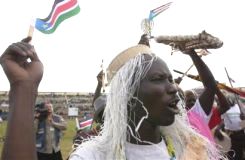Thousands march Juba’s streets to celebrate southern deal peace signing
By MOHAMED OSMAN, Associated Press Writer
JUBA, Sudan, Jan 9, 2005 (AP) — Peace descended on this civil war-scarred city Sunday as thousands of cheering southern Sudanese joined hands on a procession to ritually cleanse its streets of the torture and pain that had trodden their paths.

|
|
A supporter of Sudans Peoples Liberation Movement, SPLM, waves a flag to celebrate Sunday, Jan. 9, 2005, at Nyayo Stadium, Nairobi, Kenya during the signing of Sudan Comprehensive Peace Agreement. (AP). |
“If I die today then I will die in peace because we used to be living in a huge prison but now with the peace treaty everything is open, especially our hearts,” said Helda Gokunta, a 42-year-old Christian janitor at the University of Juba, after the signing of a peace treaty to end the 21-year southern war.
Gokunta, like many of government-held Juba’s mainly Christian and animist residents, suffered greatly during the conflict, which killed more than 2 million people, mainly through war induced famine and disease, including her mother, father and brother.
But Sunday’s signing of a peace treaty in Sudan’s southern neighbor, Kenya, ended the African continent’s longest running war and brought joy to thousands, despite the hot, humid weather that cloaked the city’s wide, tree-lined streets.
About 5,000 people, mainly ululating women wearing white gowns and red head scarves with white roses pinned to them, were formed into a procession to march from a former military staging ground that is now used by barefooted children to play football and area residents to stage celebrations.
“Lines of four and stand next to people from different churches and tribes,” a man’s voice bellowed from a hand-held megaphone before the buzzing crowd started its 4 mile (6.5 kilometer) walk through the city bound for St. Joseph’s Church in central Juba.
“We want to purify the roads that witnessed harassment and torture,” said Father Santo Loku Pio, secretary general of the archdiocese of Juba.
Before the procession started, thousands observed a two-minute silence “to commemorate the death of our sons, daughters, fathers and mothers who with their deaths initiated this peace process,” Pio said.
Across a main street in Juba was hung a banner praising southern rebel leader John Garang, a man who has fought Sudanese forces for decades but signed Sunday’s peace treaty, which in turn grants him a first vice presidency in a new government of national unity.
“Garang and Taha are two sides of the same coin of peace, stability and progress,” read the banner that also referred to co-treaty signatory Vice President Ali Osman Mohammed Taha.
Some, however, believed the politicians should not be given all the credit.
“Don’t be fooled that it was Omar el-Bashir or Garang that brought this peace,” said 21-year-old Juba mechanic Stephen Wani. “It was God that put this idea in their hearts as well as pressure from other people outside.”
U.S. Secretary of State Colin Powell was among foreign dignitaries who witnessed the peace treaty signing. Pressure from Washington and the United Nations was a major factor in the securing of the deal.
Despite the outpouring of joy and hope, Pio, the Juba archdiocese leader, was unsure how much faith to place in the peace treaty.
The fighting first began in the 1950s. A fragile peace was reached in 1973. The civil war restarted in 1983, when the Arab-dominated government in Khartoum tried to impose Islamic law on the south. Under the agreement signed Sunday, Islamic law can be used in the north without infringing on the rights of non-Muslims there or in the south.
Many will only believe it once Garang, who is from the Juba area, returns, but there were no plan for such a visit. But el-Bashir was expected to hold a peace rally here on Monday to kick off a triumphant southern tour.
“The suffering and the harassment was far too great to believe that now it’s over,” Pio said. “Everywhere I go as a priest, people keep asking me, `Father, is it true that peace has come, finally?'”
The southern accord has raised hopes a power-sharing formula also can be reached to halt bloody fighting that has killed tens of thousands in the western Darfur region, where rebels rose up against troops in February 2003 after accusing el-Bashir’s government of years of neglect and discrimination against Sudanese of African origin.
